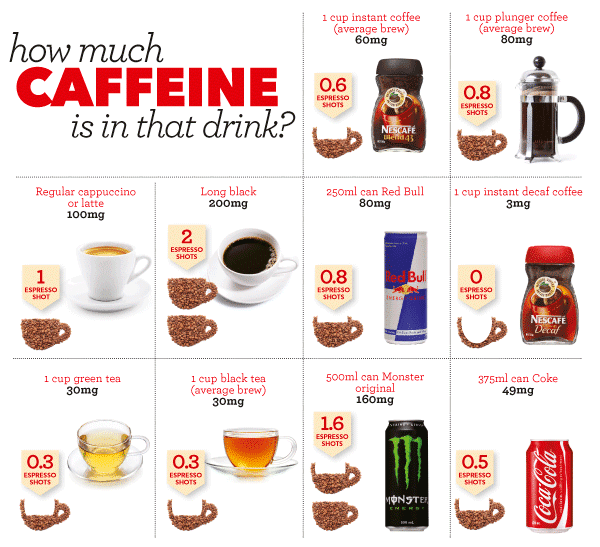As much as I love my coffee, I am curious to find out if there is a valid enough reason to change my habit of having 2 cups of cappuccino as I am approaching my peri-menopause years. For many of us in this age bracket (mid to late 40s), we may start to experience extreme hormonal fluctuations leading to our last mens and some study suggested that caffeine (the active ingredients in coffee and other food items) consumption exacerbates menopausal vasomotor symptoms such as hot flashes, night sweats etc. But how much do we actually know about caffeine and our own body’s reaction to it?
I always believe that knowledge is power. So let’s get deep into the rabbit hole of caffeine research and study, shall we? During my research, I found a very comprehensive report, Caffeine for the Sustainment of Mental Task Performance, which many of the discussion & findings here in this blog post are based on. The report was originally intended to analyze the efficacy of caffeine to enhance the soldier’s performance but much of the information is also very relevant to us, the general public.
History of Caffeine Use
To date, Caffeine is found in more than 60 different plant species, primarily found in coffee, kola nuts, tea and chocolate/cocoa. Legend has it that around 3rd century AD, a shepherd in Ethiopia noticed that his goats became very frisky and agitated after eating coffee berries or “beans”. The curious shepherd then decided to try chewing some of the berries too himself and notice their stimulant properties.
Following this early findings, cultivation of coffee plant begun around 6th century AD. Some recorded usage including an abbot brewed coffee beans in hot water to help him stay awake and in Africa, the crushed berries were mixed with fat and taken as food to enhance warriors performance in battle. Around the same time, the use of tea was recorded in Tang Dynasty of China (618–907 AD). By approx 1000 AD, coffee reached Yemen, where it became a popular social drink among Muslims. From there, this popular caffeine-containing beverage spread to much of Europe and America.
And Today, caffeine is the most widely used central nervous system (CNS) stimulant in the world. At least 64% of Americans drink coffee which equals to about 400 million cups of coffee every day or 146 billion cups of coffee per year…… WOW
Talking about coffee statistics, here are a few more fascinating ones:
- 64% of American adults currently consume coffee every day.
- Americans drink about 400 million cups of coffee every day.
- 66% of women drink coffee every day, compared to 62% of men.
- Most women like drinking coffee for relaxation. Most men drink coffee to improve their efficiency.
- 79% of Americans prepare coffee at home.
- 65% of US adults drink their coffee with breakfast
- About 35% of coffee consumers usually drink black coffee.
- Robusta beans have a higher caffeine content than Arabica beans.
Efficacy of caffeine
Caffeine has been shown clinically to induce a variety of positive effects that have contributed to its extensive use worldwide. A brief summary of research findings on the efficacy of caffeine is presented below:
Physical Performance
Caffeine’s primary mechanisms for stimulatory activity appear to be the blocking of adenosine receptors, in particular A1 & A2a receptors. By inhibiting the adenosine to bind with its receptors, caffeine indirectly affects release of more adrenaline and dopamine (Daly et al., 1999) in the system as well as increase coronary blood flow which in return causing increase of alertness and reproducible increase in endurance time in activities of moderate intensity and long duration
Four separate reviews (Dodd et al., 1993; Graham et al., 1994; Spriet, 1995; Tarnopolsky, 1994) have concluded consistently that caffeine enhances endurance performance in a variety of activities (i.e., running, cross-country skiing, cycling), with doses from 2 to 9 mg/kg. This result is consistent both in a trained or untrained test subjects and irrelevant to the subject’s history of caffeine use.
Cognitive Function and Alertness
Apart from physical performance, evidence is presented that caffeine can enhance certain types of cognitive performance, most notably vigilance and reaction times,as well having some effects on mood and memory.
Warburton (1995) demonstrated that caffeine administered in doses of 0, 75, and 150 mg to adult male, nonsmoking, regular caffeine users, without abstinence from caffeine prior to treatment, improved attention, problem solving, and delayed recall and significantly improved mood ratings.
As a few study has suggested, the effects of caffeine on cognitive behavior vary according to dose, the subject’s experience with caffeine, and gender. In general, low to intermediate doses (100–600 mg) of caffeine are associated with increased alertness, energy, and concentration, while higher doses can lead to anxiety, restlessness, insomnia, and tachycardia (Heishman and Henningfield, 1992, 1994). Individuals who do not consume caffeine on a regular basis appear to be more susceptible to the negative consequences of caffeine than regular consumers. With respect to gender, because of their smaller lean body mass, women may be more affected by a given dose of caffeine than men.
Caffeine content in common food/drinks
Caffeine is readily available as a beverage (coffee, tea, soft drinks, energy drinks), food (cocoa products), and pharmaceutical (over-the-counter pain and weight-loss medications and numerous other prescription drugs). Also, PMS medication such as Midol, packs a whopping 60 milligrams of caffeine in each caplet.
The amount of caffeine in some commonly consumed beverages can be seen in the illustration below, however, keep in mind that the exact caffeine content varies depending on brew time, amount consumed, etc.

(Extracted from Australian Healthy Food Guide)
Effect of Caffeine usage on 4 x most common symptoms of peri-menopause
As a food additive, caffeine is generally considered safe based on its long history of use and on extensive research conducted throughout the world for more than a century. However, despite this long history of use, modern epidemiological techniques have raised concerns about associations between continued use of high levels of caffeine and long-term health, including it’s effect on common symptoms experienced by peri-menopausal women.
-
- Caffeine’s effect on insomnia – coffee halftime, dosage, ways to prepare, all can contribute to causing trouble sleeping
Due to its stimulating effect, if you have trouble sleeping, it is best to discover your very own caffeine halftime (elimination rate). This will determine the latest time you can have your cuppa without it revving you up too much at night to have a good night sleep. For example, if you plan to sleep at 10pm, and if you estimate your caffeine halftime is 6 hours, you should have your last cup of coffee prior to 4pm.
Caffeine is rapidly and completely absorbed within an hour following ingestion. Once consumed, the mean half-life of caffeine for a healthy individuals is about 5 hours. It is important to know this rate differs between individual and can range between 1.5 and 9.5 hours (Brachtel and Richter, 1992; Busto et al., 1989). This wide range of mean half-life of caffeine is due to both innate individual variation, and a variety of physiological and environmental characteristics that influence caffeine metabolism (e.g., pregnancy, obesity, use of oral contraceptives, smoking, altitude, etc).
One study for women suggested that elimination of caffeine may also vary across the menstrual cycle, with elimination being about 25 percent longer in the luteal phase (Balogh et al., 1987). It is also suggested that estrogen replacement therapy and oral contraception used can double caffeine half-life (Abernethy and Todd, 1985; Patwardhan et al., 1980). This is due to the fact that estrogen and caffeine metabolism is processed by the same isozyme called the CYP1A2.
-
- Caffeine’s effect on Feeling of irritable, anxious & depressed
- Caffeine’s effect on Feeling of irritable, anxious & depressed
A number of researchers have found that high doses of caffeine can adversely affect mental performance. Although as discussed above, a relatively low dose of caffeine (up to 250 mg consumption per day) produced favorable subjective effects (e.g., elation, pleasantness) and enhanced performance on cognitive tasks in healthy volunteers, higher doses (500 mg or more) led to less favorable subjective reports (e.g., tension, nervousness, anxiety, restlessness) and less improvement in cognitive performance than placebo.
Negative effects may be more pronounced in nonusers than in regular users of caffeine. Caffeine has been shown to produce anxiety or panic attacks in individuals with agoraphobia or panic disorders, but not in healthy controls. However, caffeine has been shown to potentiate hormonal responses to other stressors.
There was also an association between caffeine intake and fewer problems with mood, memory, and concentration in pre-menopausal as well as peri-menopausal women, but the same positive impact has not been shown for post-menopausal women.
-
- Caffeine’s effect on Night sweats/hot flashes
- Caffeine’s effect on Night sweats/hot flashes
In the United States, about 79% of peri-menopausal women and 65% of postmenopausal women have hot flashes and night sweats. Conventional wisdom is that caffeine consumption exacerbates menopausal vasomotor symptoms by contracting blood vessels and causing hypothalamus to think that the body is hot therefore instruct mechanism to release the extra heat from the body i.e sweats.
One of the studies conducted by Mayo clinic confirms this line of thinking. The study comprehensively collects, compares and assesses menopause-related health information in the form of survey from 1,806 women. The questionnaires in the survey includes personal habits and ratings of menopausal symptom presence and severity
Dr. Faubion also recommended some of following natural strategies to control vasomotor symptoms, including:
- avoid spicy foods, hot beverages, and other potential triggers;
- stop or limit alcohol and tobacco use;
- consider stress management strategies such as acupuncture and massage;
- maintain a healthy weight, exercise regularly, and keep active
-
- Caffeine’s effect on Heavy bleeding/anemic – does caffeine inhibit iron absorption
Heavy bleeding often associated with low iron level. How does caffeine consumption affect iron absorption in our body?
One study has suggested that caffeine contained in tea/coffee if consumed with iron-containing meal leads to decreased iron absorption. However, if caffeine is consumed 1 hour after meal, the the inhibitory effect is reversed, resulting in increased iron absorption. These findings are not only important in relation to the management of iron deficiency but should also inform dietary advice, especially that given to those at risk of deficiency.
Conclusion and Recommendation
Fast fact: According to the Mayo Clinic, for most healthy adults, a moderate dose of caffeine – 200mg to 300mg a day (which is 1400mg to 2100mg a week) is not harmful.
So what is the verdict? In our opinion, it is crucial to listen to your own body to discover your best tolerances and what is best for you. Everyone is responding to caffeine in a slightly different way. Caffeine’s affect can be positive and/or negative. It comes down to the amount consumed, time of consumption, as well as many other determining factors such as alcohol consumption, smoke, diet, other health conditions etc.
However, in saying that, there are some general recommendations to minimize the adverse impact of caffeine:
- Limit your caffeine consumption to approx 200mg per day (this equals to 2 cups of coffee or long brewed black tea)
- Don’t take caffeine on empty stomach
- Figure out your caffeine halftime. Some people may only able to have caffeine prior to midday before it starts affecting their sleep. For most of us, the cut out time is around 3-4pm.
- If possible, have 1-hour interval between iron containing meal and caffeine consumption.
- When you are experiencing more problematic peri symptoms than usual, try to cut back caffeine consumption and see if it makes any difference
- If you have other underlying condition such as high blood pressure, diabetes etc, your daily caffeine limit may be lower. Listen to your body and adjust accordingly.
References:
- https://www.ncbi.nlm.nih.gov/books/NBK223808/
- https://journals.lww.com/menopausejournal/Citation/2015/02000/Coffee_or_caffeine_intake_and_effects_on.3.aspx
- https://www.health.harvard.edu/a_to_z/hot-flashes-a-to-z
- https://www.franciscanhealth.org/community/blog/first-signs-of-perimenopause
- https://www.ncbi.nlm.nih.gov/pmc/articles/PMC1876785
- /https://www.jeanhailes.org.au/health-a-z/vulva-vagina-ovaries-uterus/fibroids#what-causes-fibroidshttps://www.sleep.org/foods-with-caffeine/
- https://disturbmenot.co/coffee-statistics/

